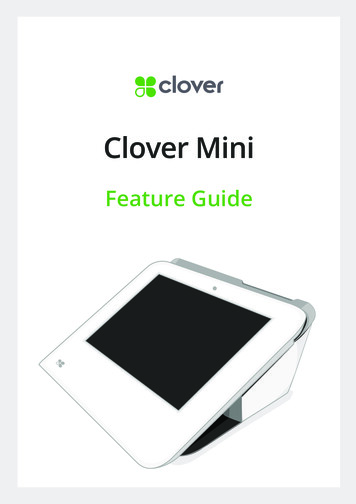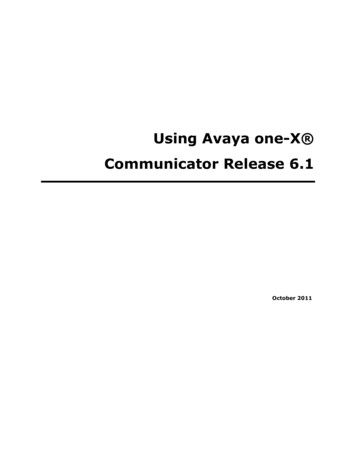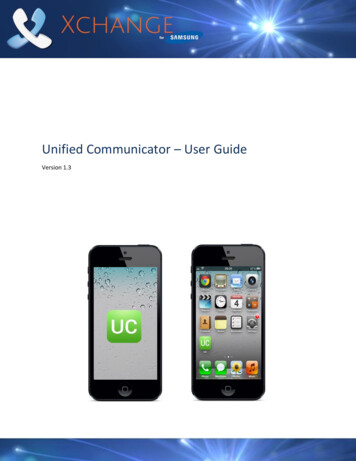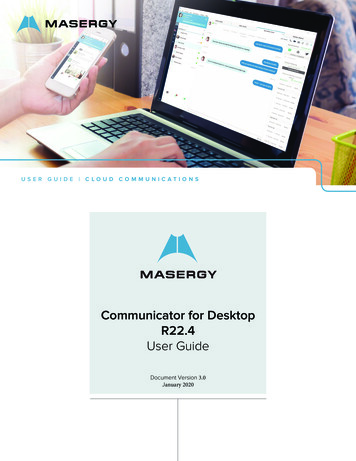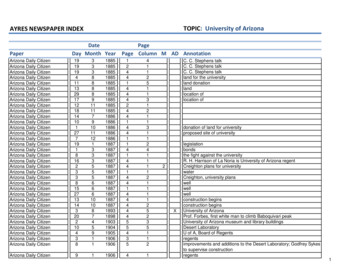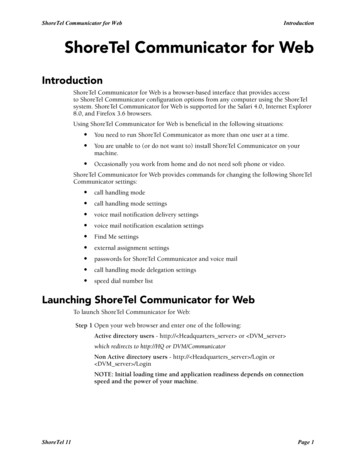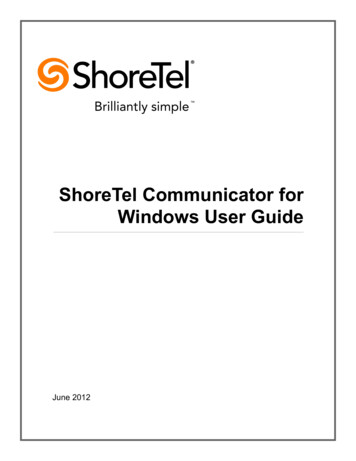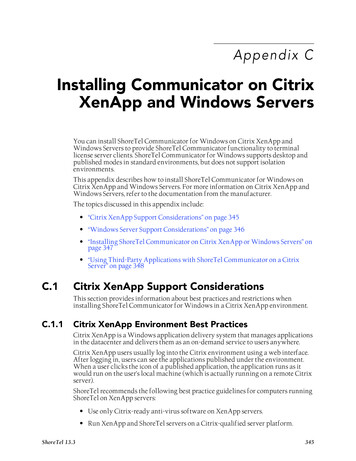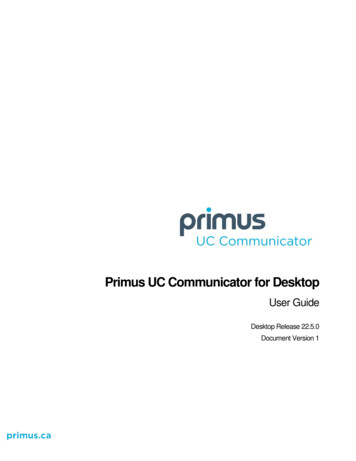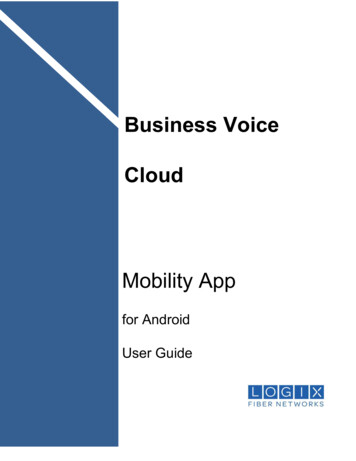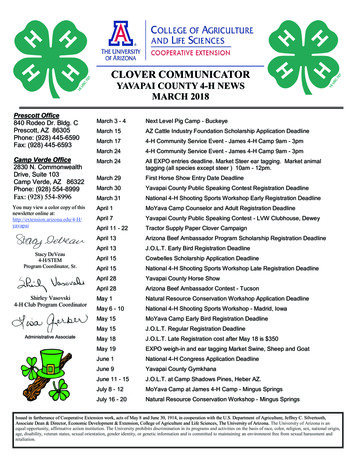
Transcription
CLOVER COMMUNICATORYAVAPAI COUNTY 4-H NEWSMARCH 2018Prescott Office840 Rodeo Dr. Bldg. CPrescott, AZ 86305Phone: (928) 445-6590Fax: (928) 445-6593March 3 - 4Next Level Pig Camp - BuckeyeMarch 15AZ Cattle Industry Foundation Scholarship Application DeadlineMarch 174-H Community Service Event - James 4-H Camp 9am - 3pmMarch 244-H Community Service Event - James 4-H Camp 9am - 3pmCamp Verde Office2830 N. CommonwealthDrive, Suite 103Camp Verde, AZ 86322Phone: (928) 554-8999March 24All EXPO entries deadline. Market Steer ear tagging. Market animaltagging (all species except steer ) 10am - 12pm.March 29First Horse Show Entry Date DeadlineMarch 30Yavapai County Public Speaking Contest Registration DeadlineFax: (928) 554-8996March 31National 4-H Shooting Sports Workshop Early Registration DeadlineYou may view a color copy of thisnewsletter online at:http://extension.arizona.edu/4-H/yavapaiApril 1MoYava Camp Counselor and Adult Registration DeadlineApril 7Yavapai County Public Speaking Contest - LVW Clubhouse, DeweyApril 11 - 22Tractor Supply Paper Clover CampaignApril 13Arizona Beef Ambassador Program Scholarship Registration DeadlineApril 13J.O.L.T. Early Bird Registration DeadlineApril 15Cowbelles Scholarship Application DeadlineApril 15National 4-H Shooting Sports Workshop Late Registration DeadlineApril 28Yavapai County Horse ShowApril 28Arizona Beef Ambassador Contest - TucsonMay 1Natural Resource Conservation Workshop Application DeadlineMay 6 - 10National 4-H Shooting Sports Workshop - Madrid, IowaMay 15MoYava Camp Early Bird Registration DeadlineMay 15J.O.L.T. Regular Registration DeadlineMay 18J.O.L.T. Late Registration cost after May 18 is 350May 19EXPO weigh-in and ear tagging Market Swine, Sheep and GoatJune 1National 4-H Congress Application DeadlineJune 9Yavapai County GymkhanaJune 11 - 15J.O.L.T. at Camp Shadows Pines, Heber AZ.July 8 - 12MoYava Camp at James 4-H Camp - Mingus SpringsJuly 16 - 20Natural Resource Conservation Workshop - Mingus SpringsStacy DeVeau4-H/STEMProgram Coordinator, Sr.Shirley Vasovski4-H Club Program CoordinatorAdministrative AssociateIssued in furtherance of Cooperative Extension work, acts of May 8 and June 30, 1914, in cooperation with the U.S. Department of Agriculture, Jeffrey C. Silvertooth,Associate Dean & Director, Economic Development & Extension, College of Agriculture and Life Sciences, The University of Arizona. The University of Arizona is anequal opportunity, affirmative action institution. The University prohibits discrimination in its programs and activities on the basis of race, color, religion, sex, national origin,age, disability, veteran status, sexual orientation, gender identity, or genetic information and is committed to maintaining an environment free from sexual harassment andretaliation.
MEMBER IN GOOD STANDING REQUIREMENTSDon’t forget to check the Yavapai County 4-H Planning nd any additions or changes to:yc4h@email.arizona.eduYavapai County 4-H Requirements to Remain in Good StandingAll 4-H members are required to meet the following minimum standards each year. If therequirements are not met, then the member will be unable to participate in the 4-H show and sale thefollowing year. Each club has the option of adding requirements to this list. If a club does addrequirements they must notify their members in writing by the first 4-H meeting of the year. A copy ofthe club’s bylaws must be on record at the Cooperative Extension Office.1.2.3.4.5.6.7.Adhere to the expectations of the Arizona 4-H Code of Conduct.Attend Community Club Meetings, Project Meetings and/or activities in compliancewithCommunity Club’s attendance policy. *A minimum of 6 meetings must be held per year, perclub, per project. IE: Community Club must meet at least 6 times. Lamb project meetingmust meet at least 6 times.Participate in at least ONE 4-H community service event. *Please see definitions ofcommunity service.Complete a 4-H project doing one’s own work with minimal assistance from parents orothers. If a youth requires accommodations - the Received Help Form is recommended.Give a club or county 4-H public presentation for each project enrolled in.Participate in 3 recognized 4-H events throughout the year (local, county, state or nationallevel). Examples: livestock judging (local/club level), MoYava 4-H Camp (state level),National 4-H Congress (national level), or 4-H/FFA EXPO or 4-H Horse Show (county level).Club and project meetings are not a part of the 3 recognized events.Complete a 4-H record book and turn it in to your community club leader.Community Service DefinedIt is important to share kindness, but even more important to understand why youth or adults aresharing kindness. To help youth understand the difference between volunteerism, community service,service-learning and advocacy, here is a helpful guide adapted from University of TennesseeCooperative Extension. It is encouraged that all leaders, parents, and adults also read and go over thiswith the youth in their clubs.Page 2
MEMBER IN GOOD STANDING REQUIREMENT .continuedService-learning is .According to the National and Community Service Trust Act of 1993, service-learning is a methodwhereby participants learn and develop through active participation in thoughtfully organized servicethat: Is organized in and meets the needs of a community;Helps foster civic responsibility;Enhances the educational component of the community service agency; and,Provides structured time for participants to reflect on the service experience.In short, service-learning is community service that teaches volunteers about themselves and theworld around them.Service-learning is NOT the same as Volunteerism- a term used to refer to people who choose on their own to perform someservice for others without pay Example: working concession stand at High School football game for free. Community Service- volunteering done in the community (sometimes done through acourt order or sentencing program) Example: cleaning the floors at the local YMCA. Youth Service- an umbrella term for all approaches to involving youth as resources in thecommunity Experiential Education- a broader term for various educational approaches thatemphasizes learning by doing.Types of Service: Direct Service- Volunteers work directly with community members or those being servedExample: Preparing and serving meals at a soup kitchen.Indirect Service- Volunteers work on an issue from a more “behind the scenes”approach. Example: Developing legislation to address and help solve an issue in theircommunity.Advocacy- Volunteers work to advocate for the alleviation of a community issue.Example: Passing out flyers about homelessness and why it matters.Service-learning is a form of experiential learning where students apply knowledge,skills, and decision-making to address community needs. This is the ideal community servicewe want to see in 4-H. Service-learning creates an atmosphere where youth continue todevelop important life skills.Page 3
MEMBER IN GOOD STANDING REQUIREMENT .continuedElements of Service-learningYouth Voice Youth Voice and PlanningListening to and engaging youth in the service-learning process provides more ownership andgreater learning opportunities for the young people.Community Need and VoiceService-learning projects should meet real community needs. To truly solve problems and provideauthentic learning opportunities for youth, actively engage the community in identifying needs. Forexample, host a mini-community forum and invite community stakeholders to attend. Contact localofficials and government for issues they feel need to be addressed in the community.Learning ObjectivesYouth should understand what they are expected to learn through their service. Outline objectives ofwhat youth will learn on a personal, social, and intellectual level.Orientation and TrainingProvide effective service and maximize the learning experience, youth must understand all aspects ofthe project: issues, organization, expectations, atmosphere of service site, date and time, personalitiesof beneficiaries, legalities, skills for any equipment they may use, what could go wrong, etc.Meaningful ServiceA successful service experience requires thorough planning of goals, resources, supervision,transportation, logistics, and risk management.ReflectionYouth should employ critical thinking skills to examine the service experience. This proves helpsyouth to grow on a personal, social, and intellectual level.EvaluationThroughout the service experience, youth and adults should analyze the process (what was done)and the impact (result) of the service.Celebration and RecognitionYouth should always be recognized and celebrated for providing valuable service to the community.Celebration can bring closure to the project and reinforces the value of the young people’s connection towhat they accomplished.Page 4
MEMBER IN GOOD STANDING REQUIREMENT .continuedWhat doesn’t count as any type of service?The following should not be advertised to 4-H members as community service: Bake Sales- these are fundraisers for the club unless specified otherwise Parades- serve as an opportunity to promote and market 4-H and should be listedunder Communications in record books EXPO Tent Set-Ups- whether they are for EXPO or scholarship set-ups, this is part ofbeing a 4-H member and only benefits you as a member. This is not “lending your hands tolarger service”. Petting Zoos- Public relations, marketing and promotion of 4-H and should be listedunder Communications. These are sometimes fundraisers as well. Caroling- If it is just listed in record books as ‘caroling’, it is not service. However, if thereis more description: “Christmas caroling at local nursing home for elderly who do not havefamilies to spend the holidays with.” Then it is service.In record books, 4-H members should describe all activities so the judges understand what they did.Simply listing the name of a park or writing ‘bake sale’ does not tell the reader anything except thoseactivities are not service. However, if the description said, “Park clean-up at Memory Park to give thecommunity a place to enjoy nature and socialize,” or “Bake sale to raise money for theChildren’s Hospital of Phoenix so they can purchase blankets for sick children,” then it would becommunity service.This guide only briefly describes the differences between different types of service. The key toremember for any service project or activity is to ask these questions: Why are we doing this activity? How does it impact the community? Who will this impact or help? What will I learn? or What did I learn by participating in this activity?If you cannot answer these questions, you should not do the activity as it is more than likely notservice-learning or meaningful service. You must understand the ‘WHY’ before you can learnfrom giving to others.Page 5
MEMBER IN GOOD STANDING REQUIREMENT .continuedWhat is Your Definition of Service?People define service in many different ways. To help get your team or club “on the same page,” here isa list of some examples of service. Study the list carefully. Rank the list from 1-14. Place a “1” next tothe action that most closely represents your personal philosophy of what Service-Learning is. Place “2’next to the action that is the second closest to your philosophy of service, etc.Go over everyone’s answers and discuss as a group.Joining the armed forces.Providing a dinner once a week at a homeless shelterTalking with a friend.Chaining yourself to an old growth tree as long as you can, so loggers will not take it.Leaving your car and biking to work or school every day.Giving 50 to the United Way.Walking a frail person across a busy street.Giving blood.Tutoring a person that cannot read.Adopting an eight-year old boy.Picking up trash in the neighborhood.Hawaiian youth teaching tourists to say, “Mahalo.”Working as a legislative aide.Donating canned goods to the local food driveHAPPY BIRTHDAY TO OUR MARCH CERTIFIED VOLUNTEER LEADERSJessica DickinsonDenyne Kirk-MartinezJennifer Gummo-WagnerGlen HuddlestonNorthern Division Livestock ClubVerde Valley 4-H ClubVerde Valley 4-H ClubShamrock Hustlers 4-H ClubPage 6March 6March 21March 22March 29
UPCOMING EVENTSPage 7
UPCOMING EVENTSPage 8
SCHOLARSHIP INFORMATIONNovember 1, 2017SUBJECT: ARIZONA STATE COWBELLE and ARIZONA CATTLE INDUSTRY FOUNDATION SCHOLARSHIPSARIZONA STATE COWBELLE MATTIE COWAN SCHOLARSHIP1. The Arizona State Cowbelle Mattie Cowan Scholarship is being offered once again this year. The ASC MattieCowan Scholarship is offered only to current high school graduating seniors. The Arizona State Cowbellesare proud to offer one scholarship in the amount of 1,500. This scholarship is offered to high school graduateswho plan to pursue agriculture degrees in hopes that the knowledge learned from our past continues and growsinto the future.Cowbelle Application deadline is April 15 – 5:00 p.m.AZ CATTLE INDUSTRY FOUNDATION’S SCHOLARSHIP2. Also attached is the AZ Cattle Industry Foundation’s Scholarship Application which is offered for graduating seniors and undergraduates. The ACIF “Foundation” Scholarship offers several scholarships invarying amounts, typically 1,500 and greater. Students must be pursuing studies in courses and careers directly or indirectly related to the cattle industry.FOUNDATION Application deadline is March 15 (Postmarked)***NOTE: THERE ARE DIFFERENT DUE DATES ON THESE SCHOLARSHIPS***PLEASE MAKE COPIES OF THE ATTACHED AND HAND OUT TO ELIGIBLE STUDENTS.Should anyone ask, the scholarship information and application can be found on our websites at arizonacowbelles.org ation.aspx. Students can complete the applications online at these websites.Please get the word out to the students, and if you should have any questions, contact me at the following: Linda Vensel, POBox 55, Patagonia, AZ 85624, ship ChairAttachment: (2) Applications: ASC and ACIF “Foundation”Page 9
SCHOLARSHIP INFORMATION.CONTINUEDPage 10
SCHOLARSHIP INFORMATION.CONTINUEDPage 11
SCHOLARSHIP INFORMATION.CONTINUEDPage 12
SCHOLARSHIP INFORMATION.CONTINUEDPage 13
SCHOLARSHIP INFORMATION.CONTINUEDPage 14
SUMMER CAMPSJune 11-15, 2018Are you ready for a lifechanging summer?Don't just go to any-old camp,come to J.O.L.T.!J.O.L.T. is an Arizona Teen Leadership Camp, designed by teens for teens. At J.O.L.T., there is apositive environment that promotes personal development, team building and self-confidence.Our mission:“To create an environment where Arizona teens can learn how to empower personal leadership, hone inon creativity, and encourage positive social change in their own community by upholding the tradition ofmaking the best better.”Learn what Arizona Teens say about J.O.L.T. and check out a cool video from the 2017 J.O.L.T. Camp(link is external)After your week long adventure at J.O.L.T., you will go back with improved leadership, trust andcommunication skills.While at J.O.L.T., you'll meet the dynamic staff, participate in inspirational workshops and life changingspeakers.Meet the Planning Team- both youth and adults.You'll also learn conflict resolution skills and relationship building skills which help to create life-longfriendships that make J.O.L.T. unique from all other camps. Each participant selects a camp InvolvementCommittee to serve on, in order to practice and enhance his or her leadership skills.Age Requirement:Participants MUST be 14 by January 1, 2018 – OR – have graduated the 8th grade before the start ofcamp.Registration:The registration packet forms are fillable - please type them and print. Print and send to your countyextension office. Contact us for help finding your local office.Registration Packet for Youth - All the forms you will need to register as a youth participant. Thispacket includes the following forms, and ALL of them must be completed for your registration to beaccepted. J.O.L.T. registration Medical Release Youth Code of Conduct Under 18 Multimedia ReleaseRegistration Packet for Chaperones - This packet includes the following forms and ALL of them mustbe completed for your registration to be accepted. J.O.L.T. registrationChaperone Agreement (must be signed by your county extension agent)Page 15
Medical ReleaseAdult Code of ConductOver 18 Multimedia ReleaseRegistration cost:Youth Early Bird- 230.00 by April 13th Regular- 275.00 Late- 350.00 after May 18thAdult Early Bird- 160.00 by April 13th Regular 225.00Extension Staff 245.00More InformationInformation Sheet - maps and other information you need to know4-H Dress Code - know what you can and can't wearGet Social!Don't forget to find us on Facebook (link is external) and follow us on Twitter (link is external)!MoYava 4-H Summer CampCAMP APPLICATIONS AND FORMSWe anticipate filling all 80 camper slots very quickly. For this reason camp applications will be for 4-Hmembers only unless space permits. Applications will be placed on a first come basis.Check out this great Camp Video (link is external). Check us out on Facebook (link is external).Mohave - Yavapai 4-H Summer Camp is July 8 – 12, 2018Campers arrive 2:00 p.m. on the 8th and depart 11:00 a.m. on 12thEarly Bird Registration Before May 15, 2018Total cost will be 150.00 for the first member of the family, and 130.00 per camper for each additionalcamper in the same family (ages 9-19). NOTE: the family discount rate applies for EARLYBIRDregistrations ONLY.Regular Registration After May 15, 2018Cost 170.00 for all, no discounts available.Camp Application for Counselors and Adult staff - Due April 1stCamp Counselors and adult staff, 65.004-H Camp Song Book 14-H Camp Songbook 24-H Camp Songbook 2 (revised)Directions to campWhat to bring and not bring to camp!Page 16
CLOVERBUD CORNERPage 17
CLOVERBUD CORNERPage 18
SUBMITTING TO CLOVER COMMUNICATORTo all 4-H club leaders and membersIf any clubs, youth, or leaders have any club updates, events, or 4-H storiesthey would like to share in the Clover Communicator please send them to meby the 25th of every month. We would love to hear what your club is doing inYavapai County. Pictures are always welcome! In your information, include the5 W’s: Who, What, When, Where, and Why. If you are promoting a 4-H relatedevent, also include contact information or how participants can get involved.The Clover Communicator is published on the 4-H website AND the YavapaiCounty 4-H Facebook page. Many people look at the newsletter on the websiteand FB page to find out what clubs are doing and where they want to join. It’san excellent way to promote your club and members.Send your information to lgerber@cals.arizona.edu and we’ll include it in theClover Communicator!ListServ Reminder: Do Not DeleteThe ListServ is used by the Extension office to send out important information to 4-H members andleaders. Please, do not delete anything before reading it if the mail is from the ListServ. We have hadmany complaints about community members not receiving any information about events, only to find outthey never read the ListServs because they do not recognize who it is from. Any ListServ emails are sentNewsletter Printed Copy SubscriptionAll newsletters are emailed and also posted on the Yavapai County 4-H website under the newsletter tab. If you would like toreceive a copy of the newsletter mailed to you, the cost is 21 per year for an annual subscription of12 issues (which is cost recovery only). Late subscriptions will not be prorated. The subscription year runs fromOctober 1 through September 30.Make checks payable to University of Arizona and mail to:University of Arizona Yavapai County Cooperative Extension2830 N. Commonwealth Drive #103Camp Verde, AZ. 86322NameAddressCity, State, Zip CodePage 19
The University of ArizonaCooperative Extension, Yavapai County840 Rodeo Dr., Bldg. CPrescott, AZ 86305Return Service RequestedWe would love to hear from you! Email your club’s activitiesto lgerber@cals.arizona.edu or submit by mail to:Lisa Gerber, Cooperative Extension, Yavapai County2830 N. Commonwealth Dr. Suite 103, Camp Verde, AZ. 86322
YAVAPAI COUNTY 4-H NEWS MARCH 2018 Prescott Office 840 Rodeo Dr. Bldg. C Prescott, AZ 86305 . Economic Development & Extension, College of Agriculture and Life Sciences, The University of Arizona. The University of Arizona is an . "Christmas caroling at local nursing home for elderly who do not have families to spend the holidays with .
